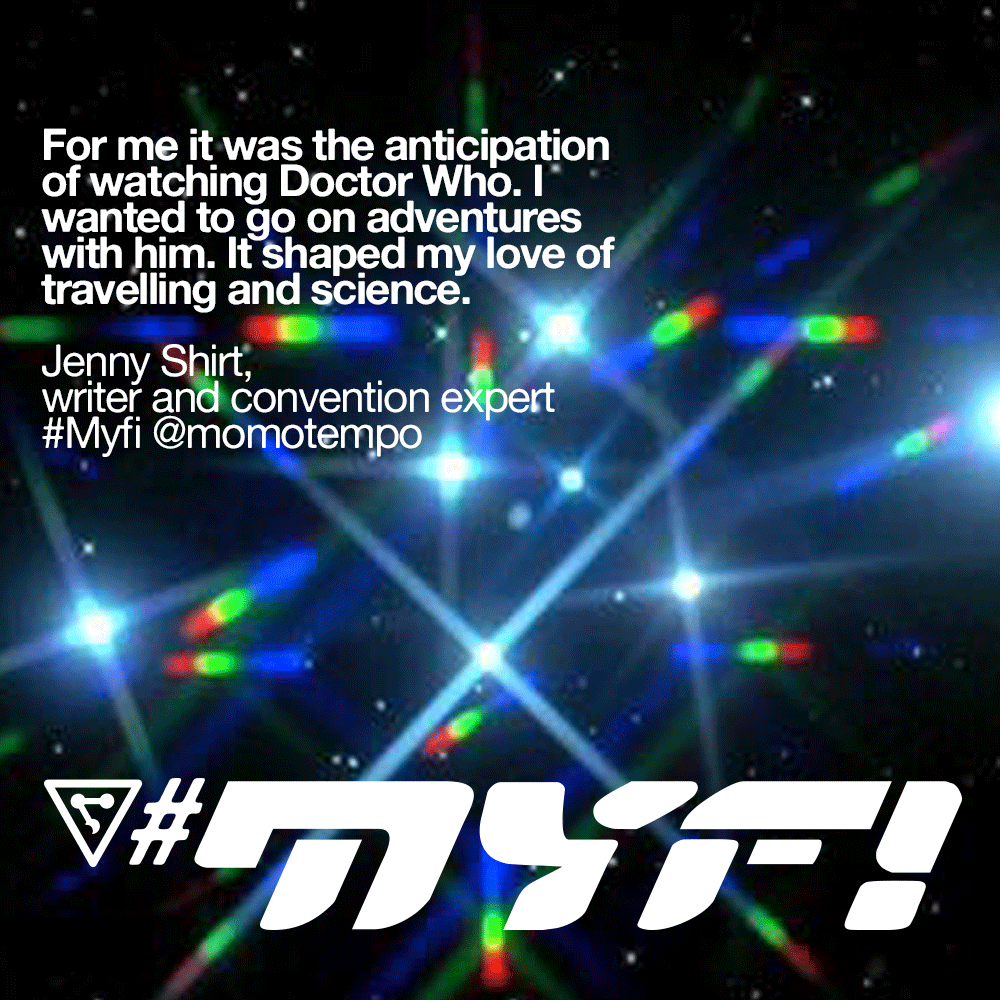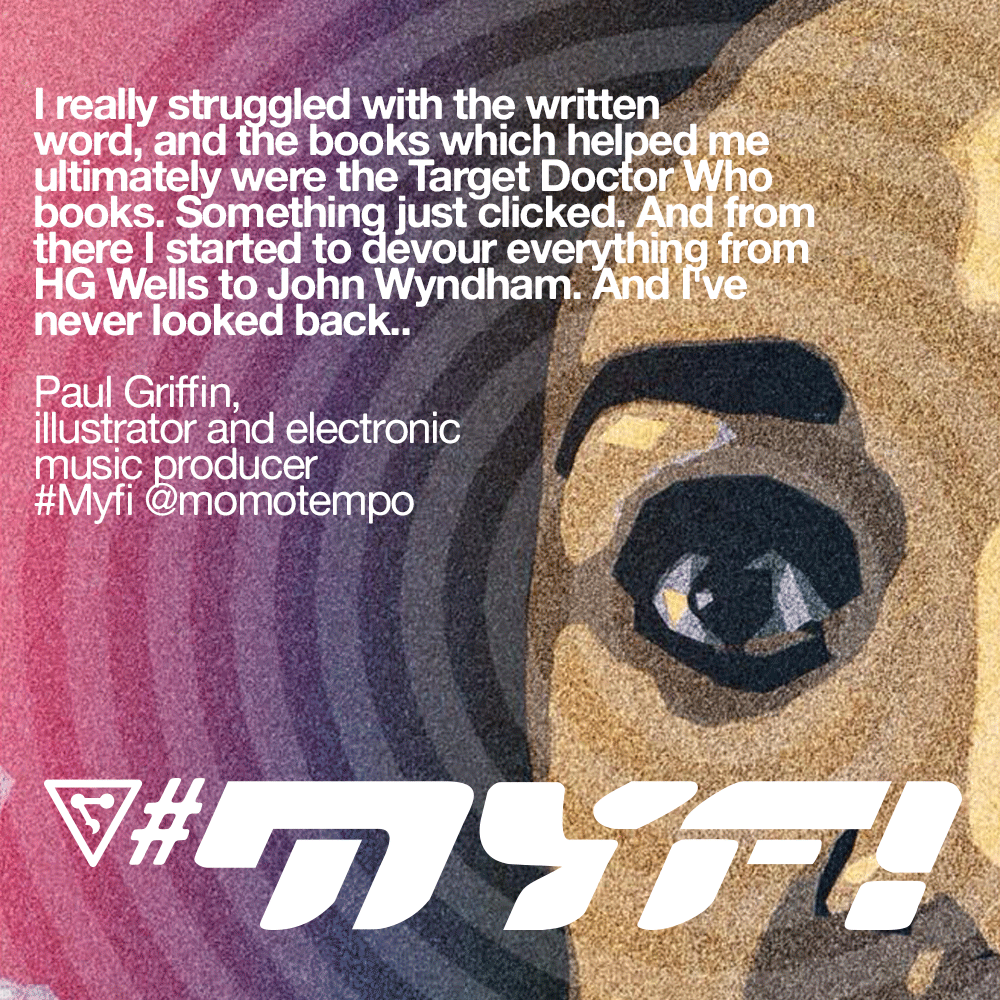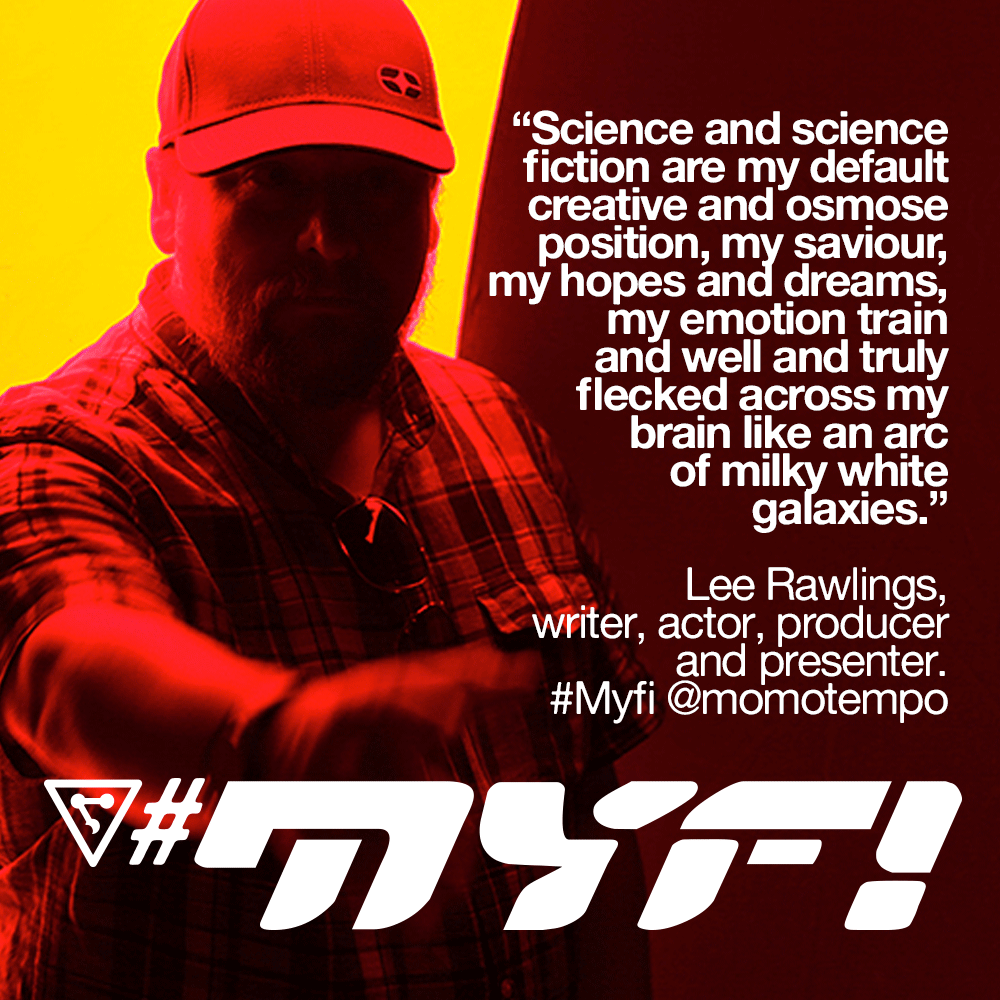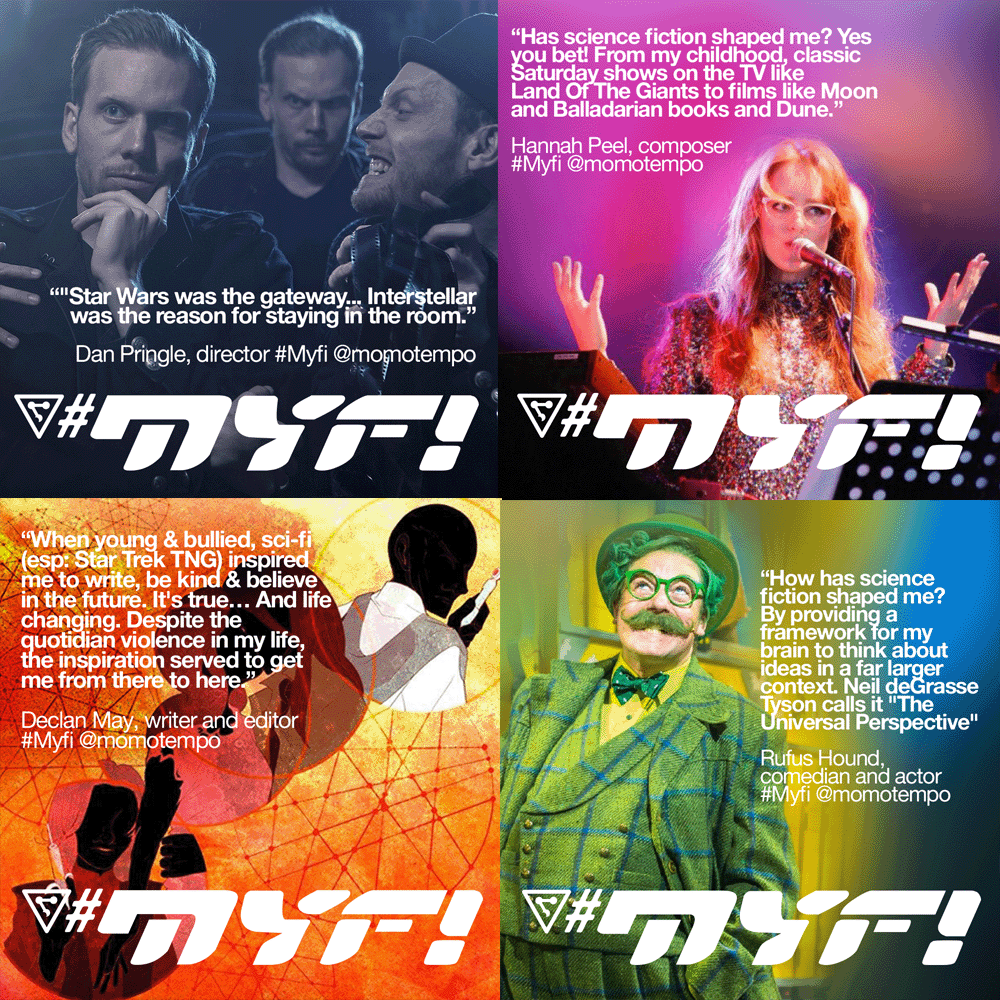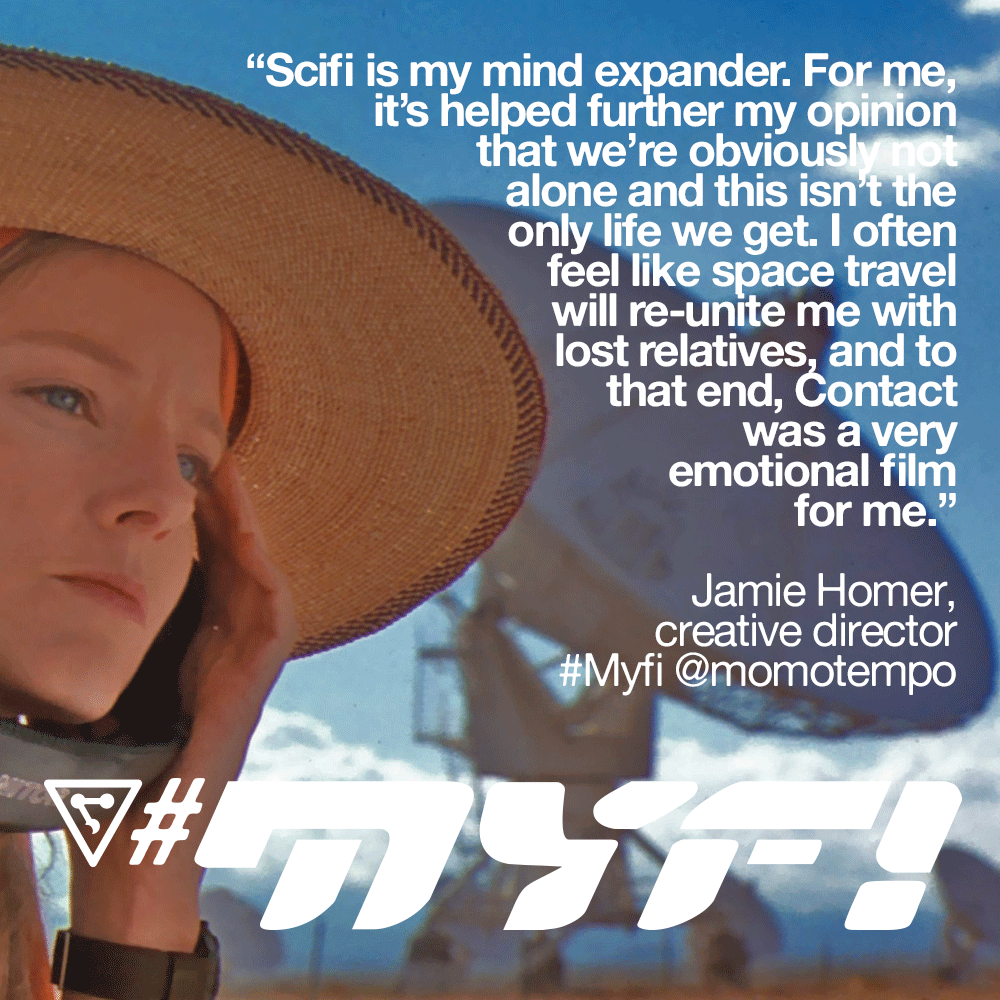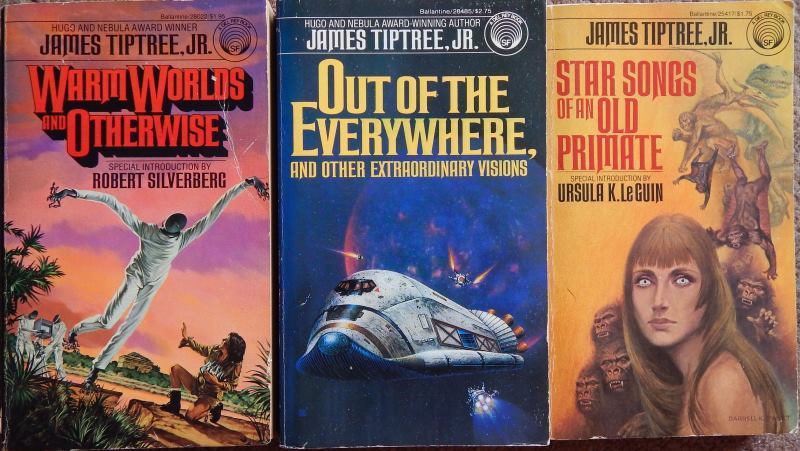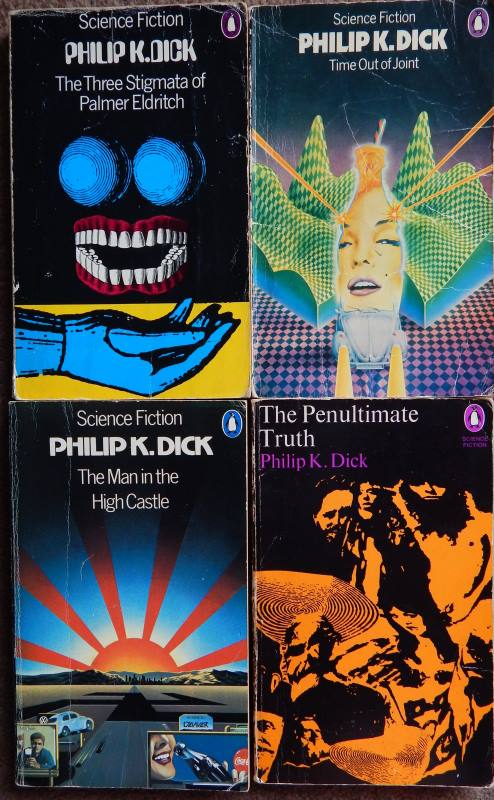Ahead of launching my ongoing online thread, Myfi – How has science fiction shaped you?, I put the first word out to the wider creative family to ask just what it is about the genre that got to people. The responses were immediate and personal. Scifi goes deep, and helps forge world outlook and even identity. This first collection of testimonies and stories is a fascinating start.
I can think of no finer place to start than with someone who epitomises fandom – a deep, loyal and loving exploration of imaginative fiction, that has lead her not simply into creativity, but to connect with hundreds of people.
Jenny Shirt, writer and convention expert
From the instant that I first watched Horror of Fang Rock I was completely mesmerised by a programme that let me travel on adventures with the Doctor. Saturday night television was exciting and I was full of anticipation, wondering where the Time Lord that I had come to love would take us next.
Blackpool Doctor Who Exhibition was something I recall so well from my childhood. I can remember seeing a Cyberman and Dalek for the first time in real life. They loomed over me and I hid behind Dad’s leg. I wanted to find out more about how the TV show was made. This lead to me wanting to work in TV or film. It became a hobby in the end but it definitely influenced my interests. I used to have the BBC Sound Effects album and created adventures of my own using a tape recorder and models.
I had a character named after me in a Charity Anthology Called Seasons of War by Declan May, something I would never have expected. I have started to write and I am enjoying it so much, and all this through my love of Doctor Who. I visited many places and conventions over the years. I think it’s a wonderful thing that after 54 years, this programme still holds so much excitement for so many people old and new.
I have met so many people that have loved the show over the years and I have formed lifelong friendships, something which I will always be grateful for. Many happy memories and good times.
#Myfi
Inspiration to explore and create seems typical of one of my oldest, dearest, most creative friends here. Still a space cadet.
Tim Colthup, musician and creative
As a child I was heavily influenced by Star Trek, Doctor Who and Battlestar Galactica. So much so that when I was nine, I put a large cardboard box inside my bedroom closet. I used magic markers and cut out pieces of paper to create buttons and control panels inside the box. I would sit in there for hours playing my space sound effect tape and pretending that I was soaring through the universe in my own space capsule. #Myfi
A beautifully evocative observation from someone who has used science fiction to make and create and bring together more ideas and people than many I know.
Simon Brett, writer, illustrator, broadcaster and music producer
These black and white squares started appearing on London buses. Black posters with white writing to be fair…but actually I think my memory may be cheating and it was yellow writing but that doesn’t matter.
Two words – “STAR” and “WARS”.
Pretty sure the strength of brand/logo also rooted some deep affinity with graphic design but who knows – these words and shapes meant something because they were everywhere and I didn’t know what it all meant – until one day there was a news report about this phenomenon that was sweeping the United States and now England – a film about heroes, princesses, hairy tall blokes, a black knight and, oh my word, a gold robot who walked around with a smaller companion robot. Smacked between the eyes. I mean, I look at the design of these things now and they feel as established in my mind as my mother’s face and almost as perfect. Then there was Han Solo. Sod Luke, I wanted (And still do) want to be Han. Of course, we’re all Luke I suppose, but you know what I mean.
So now I knew that it was a film about stuff happening in space. After the disappointment of hearing that my sister was going to see it with my older cousins (And I was too young to go with them, huh, they can’t have been *that* old then) I suddenly had a surprise trip to Bromley cinema after school as my sister had gone to a friends for tea leaving Mum and Dad free to take me.
Prior to this, I’d visited the National Science museum both with my school and with my parents. Dad had even made one of those massive Airfix Apollo rockets (I was fascinated with the mercury-like tin of silver paint) so I was fully aware of space flight. He even showed me barely visible cine footage of the moon landing that he’d filmed on a TV screen, live, as it happened. But sometimes, as much as your parents try to inspire you with Superknowledge™ as a kid you just think, “Okay, so that happened before..years ago in fact…so what’s next?”
I don’t really remember much detail of the moments after seeing Star Wars because, well, I think I experienced some kind of brainstorm. Much like that scene in the Wizard Of Oz, suddenly I saw in colour. Suddenly there were possibilities. *Endless* possibilities. And while I appreciate that Star Wars is more science fantasy than science fiction, I very much feel that something personal was unlocked at that point. That boiler cap on the adrenaline tube. The Spinal Tap “11” mark on the imagination dial.
As much as I adored Star Trek on TV (And Doctor Who was a fascinating but ultimately scary experience) it all seemed so intense, passionate and *possible* all of a sudden. And in time it became emotional and personal (Which in later years would reverse-engineer my appreciation of both Who and Trek).
I imagine that there’s a point where certain children discover the accelerator on an engine and suddenly the car goes from something that just takes you from A to B to a source of excitement, or some realise that playing with Lego converts to working with full-size bricks and architecture and making your mark on the world. When the heart suits, these things become something that makes you feel alive.
That’s what Star Wars did for me and that – along with my Dad’s old record player and homemade HUGE speakers – I owe everything. #Myfi
Earstwhile Momo family member Mark had the universe unlocked for him by his father.
Mark Adkins, drummer
I was lucky; my dad introduced me to science fiction at a comparatively early age. It started with him reading me extracts from his books (probably in an effort to pacify me to sleep). My developing imagination soaked it up like sponge! Later, dad gradually introduced me to a wide variety of books, films and tv series. I was fascinated by 20,000 Leagues Under the Sea, War of the Worlds frightened the life out of me as did Roy Thinnes’ ongoing battles with The Invaders.
I clearly remember seeing the robot, Gort, for the first time in The Day the Earth Stood Still (the 1951 version) and thinking how great it would be to show up to school with my own robot guardian in tow!
As an only child science fiction was alw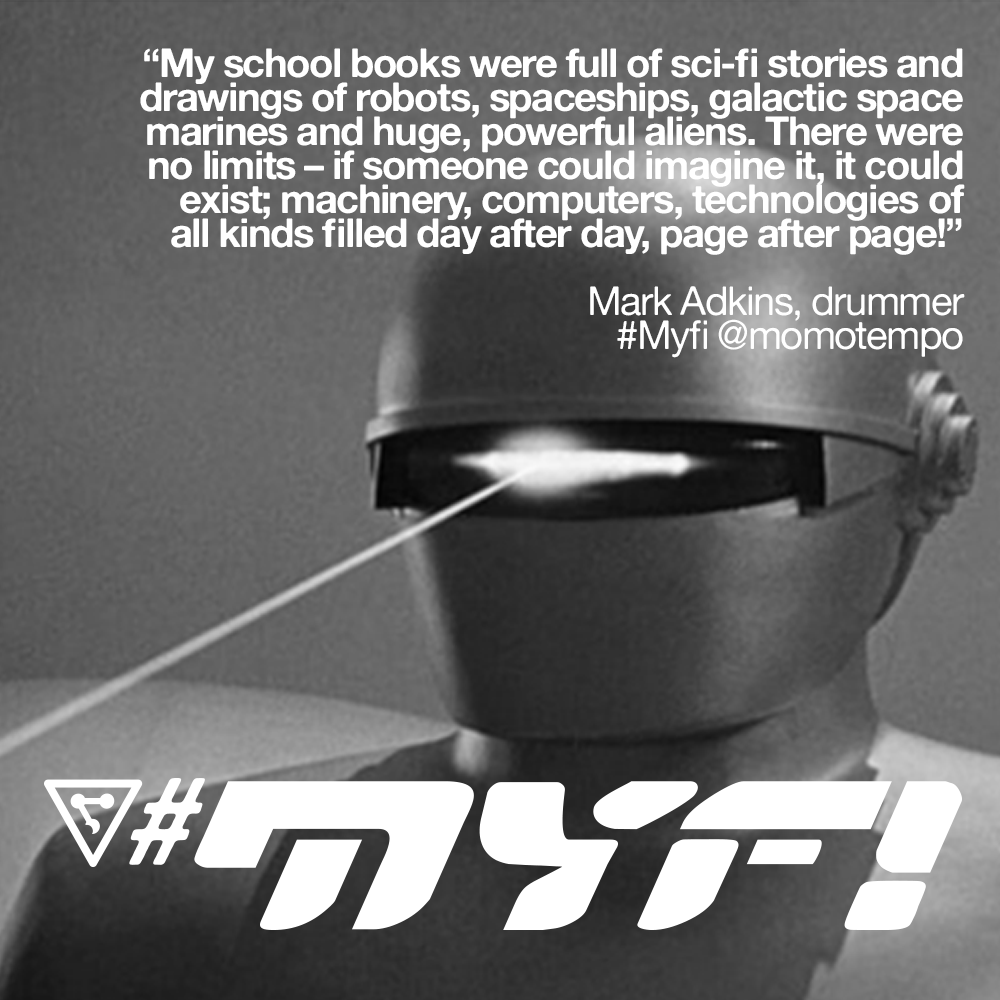 ays where I retreated to. My bedroom was a shrine to the Star Wars universe and the residents of Cybertron. My school books were full of sci-fi stories and drawings of robots, spaceships, galactic space marines and huge, powerful aliens. There were no limits – if someone could imagine it, it could exist; machinery, computers, technologies of all kinds filled day after day, page after page! One particularly purple patch of creativity came after watching The Last Starfighter. It blew my mind. I watched it over and over again – I am pretty sure I wore out the VHS tape – and I remember dreaming of getting whisked off to space to join the fight against Xur and the Kodan Armada. In all seriousness, I played Astro Wars with a new sense of purpose (the Death Blossom would have been a welcome addition to the game).
ays where I retreated to. My bedroom was a shrine to the Star Wars universe and the residents of Cybertron. My school books were full of sci-fi stories and drawings of robots, spaceships, galactic space marines and huge, powerful aliens. There were no limits – if someone could imagine it, it could exist; machinery, computers, technologies of all kinds filled day after day, page after page! One particularly purple patch of creativity came after watching The Last Starfighter. It blew my mind. I watched it over and over again – I am pretty sure I wore out the VHS tape – and I remember dreaming of getting whisked off to space to join the fight against Xur and the Kodan Armada. In all seriousness, I played Astro Wars with a new sense of purpose (the Death Blossom would have been a welcome addition to the game).
And so here I sit; a middle aged man and yet these reveries still create the same excitement; the same sense of wonder and my imagination is alive with possibilities and dreams. #Myfi
Dear amigo and fellow synth twiddler Paul observes that as a youngster, you don’t always get what you’re watching – it’s once older the stories of science fiction make more sense.
Paul Griffin, illustrator and electronic music producer
Science-fiction. The 1970s. The golden era to many a child who grew up within that era. Though what did it mean to me? And more importantly, how did, and has continued to shape me as a person?
My earliest memory is the obvious candidate: Doctor Who. I know for sure that I witnessed Autons with carnival heads giving out killer plastic daffodils. So my mum tells me without prompting. To be fair to her, I actually can’t remember any of it. Well, It was 1971 and as a 3 years old, and I don’t think I would have sat through it. Then, as with most television during my childhood it was a background companion. Nothing more. I have two brothers and a sister, all younger than myself, and when we did congregate around the TV with our tea to watch Doctor Who we inevitable talked through the transmission, mainly to make fun of the awful CSO and illogical inconsistencies and how, at the cliffhanger the Doctor was going to get out of his latest scrape.
Did I realise it was science-fiction at the time? Not really. For Television at that time was swamped with Telefantasy, and it was all just there which we watched and usually laughed at. The only movies I saw were too pompous to appreciate at such a young age. I found 2001 and Silent Running rather boring.
What changed everything was an item on Nationwide about a new film released in the USA, and a clip of a shootout with white suited baddies and what looked like a pirate escaping in a strange battered spaceship..1977… Star Wars!
This is the film which certainly shaped me, as it fired my imagination which I expressed with drawing. It was around this time I also discovered a new comic : 2000AD. Now, I was a late starter when it came to reading, and this comic could be enjoyed just by looking at the panels of artwork, and again my drawing flourished.
I really struggled with the written word, and the books which helped me ultimately were the Target Doctor Who books. I don’t know what it was about them but something just clicked. And from there I started to devour everything from HG Wells to John Wyndham. And I’ve never looked back.
#Myfi
Emma here starts with such evocation of memory – how visceral scifi on screen could be. But also how it can shape your work.
Emma Flint, Health Sector volunteer co-ordinator
#Myfi sounds from my childhood that still accelerate me, chilly-spined, into wide-eyed wonder:
– the clucking of a Triffid
– the “thank you” of a Hitchhikers’ door (and the majesty of the theme tune)
– the Ulla of a tripod
– the “wow” of a light sabre
– the turbines of an arriving Tardis
– the ticking of a Pink Floyd timekeeping synth
I read as many John Wyndham books as I could find after a visit home to the UK let me discover synthpop and The Day of the Triffids in the self same evening (I was never a good sleeper; bet I got none that night.) We had limited access to merch and media in Saudi (with a few exceptions: a pirate copy of Star Wars, a friend’s huge At-At) so most of my exploring happened through text. HG Wells, George Orwell, Arthur C Clarke lined up on my bookshelf (and even Franz Kafka’s Metamorphosis which probably counts as a sci-fi, right?)
I lapped up the monsters, aliens and the weirdness of it all, but what fascinated me most was exploring ideas of how people react to extreme situations; of confronting the “other,” of matters of survival, of loss of freedom and control… of making sense of it all. (The Handmaid’s Tale became a later favourite.) Fight scenes always annoyed me because they marked the point when communication had stopped and everything became much less interesting for me.
This took shape in my life by leading to a great love of language. I studied linguistics and especially loved psycholinguistics, and am still fascinated by how language shapes our perception, particularly of time and “the other” (two common themes in sci-fi.)
I have always enjoyed films that play with our perception of reality as we know it (e.g. The Matrix) but, a little like fighting, I was often frustrated that such elaborate systems and machines were conjured up for time/perception-shifting purposes, when here in our own heads we each possessed the device that could do it.
Last year I saw Arrival at the cinema and had tears in my eyes throughout (and sometimes on my chin). I recommend it to anyone longing for sci-fi that cuts straight to connection and perception without the need for weapons first… to collaborate and flourish instead of discover and destroy. #Myfi
Lee doesn’t mess around, but gets straight to the passionate point about the shape he is because of scifi:
Lee Rawlings, writer, actor, musician, broadcaster and events producer.
Science and Science fiction are my default creative and osmose position, my saviour, my hopes and dreams, my emotion train and well and truly flecked across my brain like an arc of milky white galaxies. I cannot live without its imaginative postulations.
How to define science fiction? George here suggests it is to do with real possibilities:
George Silk, consultant psychologist and original contributor to Cygnus Alpha fanzine
My dad was a scientist and always encouraged me to watch anything from Doctor Who (at the age of six) to 2001: A Space Odyssey (by ten). The big message was ‘anything is possible’. Anything at all. So, while I knew that The Omen was – albeit enjoyable – nonsense or The Hobbit just made up, if it was science fiction, it could really happen. And, looking back from today’s perspective, most of it has – including much better special effects on Doctor Who, though it still unsettles me when they veer too far off the science fiction path (the moon being a giant egg, for example). Science fiction was the future and it was real. It still is. #Myfi
Perhaps the most consciously values-driven TV adventure series of them all is one that successfully shaped world views for perhaps millions, as Lucy can testify to:
Lucy Robinson, charities and third sector marketing consultant and activist
I’m only now beginning to realise how my abiding love of Star Trek has so profoundly shaped me. I absolutely adored that show as a child. Speaking to Andy this morning about it, I recounted my adoration of Uhura – I thought she was beautiful. My fascination with Spock and I think I absorbed the love and camaraderie of that little ‘family’ hurtling through space facing untold dangers but also fascinating experiences.
Fast forward to 1995, 4 February: I met Andy Robinson and one of our first conversations was about our mutual love of Star Trek, my strange dream about being a space man and landing on some desolate planet where I entered a bar filled with aliens to be then told that the Fronds were on their way. I scarpered sharpish in my spacecraft (bright red!).
Star Trek taught me that we are all different but all equal. That the notion of family can be defined in many ways. That we hurtle through space in all its breathtaking beauty on this tiny, stunning blue planet, but that we can also hurtle through the space, in all its breathtaking beauty, of our own imaginations. That life is full of darkness and light. That love is the most powerful force in the universe.
For me Star Trek, in all its guises throughout the decades remains the template of how we as human beings can be at our very best. #Myfi
Barnaby Eaton–Jones, writer, performer and radio theatre producer
I think I was always influenced by looking at the bigger picture. That’s essentially what Sci-Fi does for you, isn’t it? It broadens your horizons and your mind. You learn to think outside the box.
Talking of boxes… Doctor Who was witty. He was a non-violent hero. I yearned to stride through life like he did. Then, Hitchhiker’s stuck out a thumb and found itself in my life and I realised I actually was a combination of Ford Prefect and Arthur Dent quite naturally. I also realised, for the first time, that you could write funny science-fiction. Comedy and Science-Fiction seemed to be the happiest of strange bedfellows.
But, Sci-Fi was always there, in the books I devoured (from John Wyndham to Ramond Bradbury, via Douglas Adams) and the films I watched (from 1950’s B-Movies to the ultimate B-Movie of all time, Star Wars).
For me, Sci-Fi was all about freeing your reality and drifting off into the imagination. That’s how I survive life. #Myfi
Norma here can see a bit of the longer view:
Norma Rawlings
Not sure if it has shaped me never really considered it as a question . But I am a child of the forties a teenager in the sixties and scifi was a fascinating and new back then so to see how it has progressed to the techno marvels it now has is incredible. We had no difficulty is suspending our belief then we were very innocent and possibly gullible, re Doctor Who sets costumes , monsters etc which now seem corny but lovable. I mean we we there at the beginning how wonderful is that? I suppose I may accept that there are no boundaries to imagination which is fantastic but also I suppose I am more cynical or logical about what there maybe out there, not sure really. Just know I am really happy that there are these amazing films and programmes being made around sci fi. #Myfi
Children of a certain age had a lot of kitschy scifi telly to enjoy when younger, as Ian illustrates.
Ian Davenport, DJ
Aside from a bookshelf full of all the Terrance Dicks penned Doctor Who books (more-so than actually watching the program – I guess being an only child meant I spent a lot of time reading…), my go-to was very much Buck Rogers. To the extent that I made my own Dr. Theopolis out of a paper plate to hang around my neck, possibly uttering “biddi-biddi-biddi” as I did so, but memory is unclear on this.
It’s quite possible that Colonel Wilma Deering had infiltrated my subconcious as I became older too, but that’s a whole raft of other issues. #Myfi
In this family testimony, Carl, I feel, didn’t go far enough:
Carl Anthony Morries
My love of Sci-fi led me to naming both my children after characters from two of my favourite Sci-fi series Doctor Who & Star Trek – My daughter is named Sarah because of Sarah Jane Smith and my son is James T but the T stands for Thomas because my wife refused to let me use Tiberius as his middle name. ![]() #Myfi
#Myfi
Helen gets to the truth for many in fandom. Scifi showed life from the outsider’s point of view:
Helen Stirling, actor
I wanted to be an alien. I devoured the pulp fictional accounts of alien worlds, cultures and species. I yearned for the different rather than the human (which by my young experience was very shallow and bullying).
My alien was me. The me who didn’t need to hide the fact that I was cleverer than most of the class, that didn’t get egged or floured on a regular basis and that had no voice.
I’m now sat on a train, heading to London for a couple of days work. Naturally my mind turns to SF. I’m surfing the tinterweb on my mobile phone. It has as much, if not more, computing power than something that would fill a room a mere 50 years ago. Much of what we see around us now, and take for granted, was science fiction at one time. Brilliant, flexible imaginations saw possibilities and wrote about them and sometimes worked to bring them about. We are able to take advantage this progress.
It can bring us closer together – I regularly chat to my sister in NZ and my friends in America, Canada, UAE, Australia. It can also keep us relatively isolated in our own echo chambers. It’s allows dialogue and division, education and evil. We’ve read, seen, heard the warning in every dystopian future imagined. But the utopian tales give us a chance to fight for the future not yet seen. That undiscovered country. #Myfi
For slightly more mature fans, science fact was a huge part of the draw to explore space.
Shep Andy Elliott, bearded biker
When i was a little bit younger than i am today the Apollo missions and moon landings were happening, so incredible to my little mind was this feat of human achievement, everything about space travel enraptured my imagination and scifi inevitably became the source to feed my hunger and passion for all things space and future related, the comic books and annuals from the Jetsons to Doctor Who , I also was an avid builder of cardboard space ships and possibly flew in a galaxy near your other contributor, I think though my personal favourite at the time was UFO although I only got to watch it with my Dad as Mum thought it a bit scary for a little one , she may have been right. #Myfi
Chris points out how much of the fiction in scifi has tuned to fact:
Chris Pearce, IT consultant
Since a young age I was always drawn to Sci-Fi with the 3rd incarnation of Dr Who to the original Star Trek and Shatner’s funny running across a quarry in LA. The earliest film (and very prophetic it turns out) that really had an impact on me was Silent Running. Plant life on Earth extinct, floating greenhouses in space attended by cute robots, way before R2-D2. Then the came Star Wars etc. Alien and Blade Runner then showed that space isn’t all clean, white gleaming spaceship corridors and cute cuddly aliens but a dirty, working, industrial ship and a parasitic, near indestructible alien that kills humans with ease, oh joy. Now science fiction is science fact with handheld computers, wi-fi and self driving cars but still no matter transporter! Hyper-Loop is on its way so we can whizz to continents under ground. Who remembers Genesis 2 and Planet Earth? #Myfi
Tim says, however, it was all about books:
Tim Haywood, broadcaster and music critic
I’ve always been a voracious consumer of good books. Before I was 10 I was given a sci-fi anthology at a Christmas or birthday. Then the BBC game Elite came out, along with a Robert Holdstock book introducing some of the 255 worlds in an invented universe… I still play Oolite today occasionally
In my teens, I lived in a holiday park mum and dad bought; in one of the lodges someone left an Isaac Asimov book which woke me up to a whole new world of writing. For my O levels, I wrote sci-fi stories which led to my A grade English language.
Its still books for me, movies and TV series’ entertain; only books contain the power to transport one to a new galaxy or universe.”
And almost final word goes out to someone I have been working with closely over the last 18 months, who speaks volumes here about what has brought us together especially in that time:
Andy Robinson, director
There are so many moments of my life that are connected to Science Fiction, but there is one childhood memory that evokes a powerful response. Entering the grown-up section for the first time of my local Library in East London. And discovering the Sci-Fi section tucked away in a corner (just after ‘Romance’). The shelves were lined with yellow-covered hardback books published by Gollancz, so no wonderful pulp artistry, unfortunately. But there was a treasure-trove of the most brilliant SF writing: Arthur C Clarke, Frederick Pohl, Bob Shaw, Ian Watson, and so many others. The experience of finding these books was so visceral – this was surely how Howard Carter felt when he uncovered Tutankhamun’s tomb.
This might turn out to be one of the most important books I own – The Usborne Young Scientist Book of Spaceflight. I must have been 9 years old when I got this. Apollo was a recent memory, and the Shuttle was still 5 years from its maiden flight. So much of what was in this book WAS science fiction – and sadly still is. We haven’t set up a moonbase, or driven a manned rover across the surface of Mars – and as a kid there was no way I was going to believe that none of this would still not have happened by the time I was the same age as my Dad.
Now I am the same age as my Dad was, and my daughter not much older than me when I got this book. She is also around the age that the first astronauts to Mars would be right now – though none of them realise it yet.
This book was pregnant with possibility, and the excitement of scientific exploration & adventure – no less thrilling than the novels of Jules Verne. And because there is so much yet undone, this book STILL excites me. In its way, it has shaped the direction of my life more than I realised until quite recently.
And I hope to live long enough to see some more of the science fiction within its covers become science fact. #Myfi
Last word will take us all to school, which I am always so very happy to be helped to do by Jez’s inexaustible understanding of things:
Jez Winship, curator.
I can’t really remember a time when I haven’t been entranced by science fiction. Like so many 70s children, Doctor Who and Star Trek were a constant presence, alongside the serials which created a sense of the weird and eerie, often located in West Country locales (The Changes, Children of the Stones, Sky, Raven etc). I vividly remember my mum including an Edgar Rice Burroughs paperback in my Christmas sack one year (probably lightly scented by the adjacent Satsuma) – The Moon Maid, I think. Not one of the Martian novels, anyway. Which would have been more appropriate, since I also got a torch with a couple of filters you could slide down over the bulb: red and green. I read it under the covers in the bottom level of the bunkbed (my older brother got the top spot, ascended to by a little ladder).
Later there was Star Wars, which triggered my obsession with going to see any science fiction film which came to the ABC cinema in Sidcup, or neighbouring screens in Eltham Well Hall (a beautiful art deco building), Bexleyheath or Welling. All gone now. I loved them all, from Battle Beyond the Stars to Battlestar Galactica. Only the rerelease of 2001:A Space Odyssey proved baffling to my young, early teen self. I bitterly regretted the decision to see it in preference to Warlords of Atlantis. It was not yet time.
That Edgar Rice Burroughs book which my mum perceptively gave me led me to many more SF paperbacks, including the George Lucas Star Wars novelisation and Alan Dean Foster’s Splinter of the Mind’s Eye (I think he might actually have written the Star Wars book too). As I grew into my teens, a number of writers grew absolutely vital to my developing worldview.
I became very withdrawn at secondary school and felt like a complete outsider. I wasn’t learning anything beyond O levels and nobody bothered to tell me that I was evidently failing (I flunked my A levels, scraping through at English through the benefit of my own reading). I got nothing from any of the teachers there (other than an instinctive antipathy towards assumed authority) and still regard myself as essentially self-educated. And that education came through a number of SF writers who really formed the person who I am today.
My main man was Sam. Samuel Delany. I adored him, his poetic writing and outsider characters. Dhalgren and Triton were revelatory and were fundamental in defining my liberal worldview. Science fiction can be great at creating a sense of the plurality of experience, of the sheer multiplicity of ways of being. Loving the alien, as Mr Bowie put it. Realising that there are perspectives wholly different from your own which are equally real and vital, and that such variety is to be celebrated. Sam, or Chip as his friends called him, was writing from the perspective of a young black gay man in New York, and his experiences are translated into science fictional form. If I didn’t know that reading The Fall of the Towers, Nova, Babel-17 and The Einstein Intersection, I sure did when it came to Dhalgren. It was just such a hugely important book to me as a teenager, and long overdue a re-reading. I still read Delany whenever his increasingly infrequent books are published, although it’s now necessary to buy American imports, since he is not published in this country. Whether that’s because of the explicit nature of his fiction, I don’t know. Sprawling utopian epics like Through the Valley of the Nest of Spiders combine gay pornography with social commentary and futuristic speculation. I do remember the excitement of finding Triton in the Forever People bookshop in Bristol on a passing visit. His books were always difficult to find, and that meant that the thrill of discovery was all the sharper.
Harlan Ellison was another hero, and I found his ornery persona utterly beguiling. His fiction, almost all in shorter form, was incredibly intense and with an unfailing moral core, often underpinned by anger or a fierce humour. He remains a cornerstone in my moral upbringing. The story Deathbird is still a favourite and packs a massive emotional punch every time I read it. He also wrote the best Star Trek episode ever, The City On The Edge of Forever (although, as ever with Harlan, controversy reigns over alterations made to his script. His intro to its published version – longer than the actual script itself, is funny, angry and a rallying cry to respect the integrity of the writer). He showed how science fiction and fantasy (speculative fiction was his preferred term) could be used to create moral fables, the language of SF used as powerful metaphor. His anthology Dangerous Visions was also a big influence on me, introducing me to SF as a provocative literature capable of challenging the status quo, of highlighting the fucked up nature of modern society and suggesting alternatives.
This radical side of SF, both politically and in terms of its form, was also a major part of my increasing interest in it, and in particular in the writers associated with New Worlds magazine in the 60s and 70s, as edited by Michael Moorcock and other hands.
I retreated from the 80s, whose slick corporatism and Thatcherite politics I loathed, and took refuge in the 60s counterculture.
New Worlds was part of that, alongside all the music I was discovering (including Jefferson Airplane, who made significant use of SF imagery, quoting from John Wyndham and being nominated for a Hugo Award for the album Blows Against the Empire, a favourite of mine). New Worlds could be pretty bleak, but I found the writing of JG Ballard, Thomas Disch, John Sladek, M.John Harrison and Moorcock himself (particularly with his Jerry Cornelius novel and stories) utterly exhilarating in the various anthologies I picked up. As JG Ballard suggested, this was fiction which explored inner rather than outer space.
I often found these 60s and 70s paperbacks in the Lewisham Popular Bookshop I visited with eager regularity (although never the back room, frequented by furtive men fingering the magazines on offer there). I would travel there on the 21 bus from Sidcup with a bag full of books which I would exchange for other titles, returning equally and thrillingly laden. I still remember the excitement of those trips, and have a few treasured books with the diamond stamp on the front page to this day. Paperbacks which have meant a great deal to me are like revered artefacts which I have kept hold of through the years. There is a history, physical and mental, inherent in them. I would later cycle up to the Quality Communications book and comic shop north of Lewisham which was the home to Warrior comics. I’d pick up copies there, along with paperbacks (Now Wait for Last Year by Philip K Dick I remember) and old issues of The House of Hammer, and read the latest episodes of new serials by a writer I’d discovered called Alan Moore. Marvelman, The Bojeffries Saga (very south London) and V for Vendetta, which made a huge impact (still better in black and white, by the way).
Other writers were also significant influences in forming my worldview. Joanna Russ introduced me to feminism via The Female Man and her short stories. The stories of James Tiptree Jr (reluctantly outed as Alice Sheldon) were amazingly powerful, dark and unforgiving, fixated on death and with phenomenal emotional affect. Jesus Christ, The Women That Men Don’t See and The Screwfly Solution. And And Her Smoke Rose Up Forever. Those stories remain indelibly burned into my consciousness.
Ursula Le Guin’s profoundly nuanced philosophical fictions like The Left Hand of Darkness and The Dispossessed, drawing on the sense of cosmic balance in the Taoism she drew upon, impressed upon me the need to step back and view things from a wider perspective. Ray Bradbury introduced poetic imagery and language, making the fantastic out of the everyday. The opposite of hard SF, which was never really my thing, to be honest.
Philip K Dick was another big teen guru for me. His sympathy for the little man, the confused, damaged and fucked up made a profound connection, as did his perceptive insight into the games of power and control played by individuals and entrenched systems of power. The metaphysical dimension of his fiction, his fascination with religion and the mystical experience, also deeply affected me. I’ve often thought that science fiction is the religious literature of the rational age.
Close Encounters is definitely a religious movie. As is Interstellar. As is Arrival etc etc. Actually, some of the great science fiction novels and stories have been written by people with religious beliefs. Gene Wolfe’s stories in his collection The Island of Doctor Death and Other Stories and Other Stories (not a typo) are fantastic, and made a big impact on me as a teen. He’s Catholic. And then there’s Walter M Miller’s A Canticle for Leibowitz, a real classic of the genre. Another Catholic writer. There’s something about the moral dimension, perhaps. Certainly an element of the genre that I, an agnostic, find fascintating.
Kurt Vonnegut was another whose moral worldview was very important to me. I remember reading The Sirens of Titan whilst sitting beside Lake Windermere. The mordant humour, tempered by his experiences in the second world war, was very appealing. And was (along with Cat’s Cradle) very much in line with The Hitch-Hiker’s Guide to the Galaxy, which I listened to on the radio (recording it on C90 cassettes) before the publication of the book (not The Book). The cosmic perspectives of SF are very good (sometimes mercilessly so) at underlining the absurdities of human habits and aspirations.
Then there’s Olaf Stapledon, whose novels of the 30s and 40s are simply some of the most profound works of philosophical fiction ever written, and completely blew my mind as a teenager. The cosmic perspectives and imaginative range and freedom of Last and First Men and Starmaker are just astonishing. Modern religious classics for a secular, but still questing age. And I’ve just reread Sirius, his tale of a dog given human intelligence, his struggles in the human world and search for love, written in the shadow of war. Just so, so profound and moving. He is one of the great writers of the 20th century, admired by Virginia Woolf , who wrote him what amounted to a fan letter (another reason to love her). If he hadn’t been writing in the fantastic mode, he would surely be more widely recognised.
I continue to find inspiration in SF and the literature and cinema of the fantastic in general. I’ve always preferred the fantastic over realism in the arts. I love the sense of imaginative play and freedom, of making the world anew, introducing new elements to it, positing alternatives or simply inventing new realities.
Far from being escapist, I think it broadens mental horizons, helps develop empathy towards those branded as ‘other’, heightens the sense of the sacred, of the sheer multivalent enormity of the universe, suggests alternative possibilities which makes it clear that the present state of things is not eternal, there are other alternative realities; this and much more which keeps me reading and searching. Watching the skies.
Sorry it’s so long, but science fiction really has played such a formative part in my life. I could go on. But I won’t.
A beautiful way to finish a first blogged anthology of responses to #Myfi there from Jez. And now, over to you – how has science fiction shaped you?
Zap me with the tag #Myfi on: Facebook.com/momotempo or @momotempo on Instagram or Twitter.
And feel free to explore the Myfi original group, which has whole threads below the posts above, along with others:
https://www.facebook.com/groups/myfimomo/
